Plot
Described simply as "A Detective Story", the plot summary in The Edison Kinetogram was: [2]
A detective is just a machine. Someone has done something or something has happened that is more or less of a mystery to the lay mind. A detective is called in and is expected to find out who or what has caused the trouble and to set matters right. That is what he is for.
When Clark, the elder of Clark Brothers Manufacturers, discovered that sums of money varying from ten to fifty dollars were being taken from the safe in his office he sent for the police. He was told to diseharge his stenographer at once and to let it be understood in the office that she was under suspicion. He was also to send the discharged stenographer around to the Detective Bureau. This he did.
The poor girl was terrified, but upon arriving at the Detective Bureau she was assured by the detective that she was just going to have a little vacation. Of course a lady detective was sent to take her place. To discover the thieves was so ridiculously easy that by the end of three days she had two of the clerks under arrest. Too much trust had been reposed in them.
But the keen eyes did not detect the fact that the young man of the firm was sadly depressed because of the absence of the stenographer whose place the detective had taken. She had, however, observed that he was a very estimable young man and found herself taking more than a professional interest in him.
But when her time came to leave and the old stenographer came back to take her place, she found herself very much out of things. Young Mr. Clark was so much occupied in welcoming his returned friend that he had no time even to say good-bye to the detective. It hurt the girl more than she would ever have confessed, but after all she had to admit it was just.
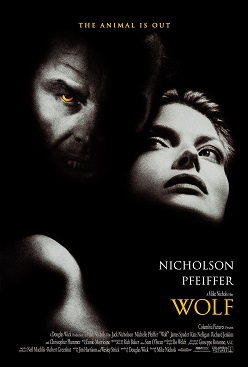
Wolf is a 1994 American romantic horror film directed by Mike Nichols and starring Jack Nicholson, Michelle Pfeiffer, James Spader, Kate Nelligan, Richard Jenkins, Christopher Plummer, Eileen Atkins, David Hyde Pierce, and Om Puri. It was written by Jim Harrison and Wesley Strick, and an uncredited Elaine May. The music was composed by Ennio Morricone and the cinematography was done by Giuseppe Rotunno.

Frankenstein is a 1910 American short silent horror film produced by Edison Studios. It was directed by J. Searle Dawley, who also wrote the one-reeler's screenplay, broadly basing his "scenario" on Mary Shelley's 1818 novel Frankenstein; or, The Modern Prometheus. This short motion picture is generally recognized by film historians as the first screen adaptation of Shelley's work. The small cast, who are not credited in the surviving 1910 print of the film, includes Augustus Phillips as Dr. Frankenstein, Charles Ogle as Frankenstein's monster, and Mary Fuller as the doctor's fiancée.

Fatal Instinct is a 1993 American sex comedy thriller film directed by Carl Reiner. A parody of the erotic thriller genre, which at the time had reached its commercial peak, as well as being a pastiche of 1940s film noir and psychological thriller genres, in particular Double Indemnity, the film stars Armand Assante as lawyer/cop Ned Ravine who has an affair with a woman named Lola Cain. Kate Nelligan stars as Ned's wife and Sherilyn Fenn stars as his secretary. The film title is a combination of Fatal Attraction and Basic Instinct, both of which starred Michael Douglas.

Tell Me Something is a 1999 South Korean Thriller-horror-crime film directed by Chang Yoon-hyun. It was an early South Korean film to find success abroad as part of the Korean Wave, and was selected to appear in the 2001 New York Korean Film Festival.
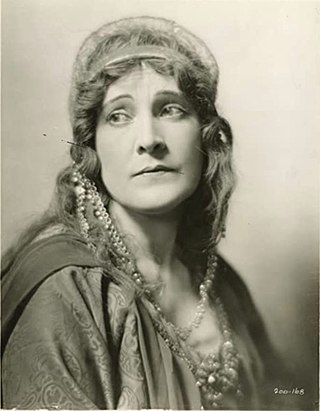
Claire McDowell was an American actress of the silent era. She appeared in 350 films between 1908 and 1945.

Laura Sawyer was an American film actress on stage and in silent films.

Pin Up Girl is a 1944 American Technicolor musical romantic comedy motion picture starring Betty Grable, John Harvey, Martha Raye, and Joe E. Brown.

Valentine's Day is a 2010 American romantic comedy film directed by Garry Marshall. The screenplay and the story were written by Katherine Fugate, Abby Kohn, and Marc Silverstein. The film features an ensemble cast led by Jessica Alba, Kathy Bates, Jessica Biel, Bradley Cooper, Eric Dane, Patrick Dempsey, Héctor Elizondo, Jamie Foxx, Jennifer Garner, Topher Grace, Anne Hathaway, Carter Jenkins, Ashton Kutcher, Queen Latifah, Taylor Lautner, George Lopez, Shirley MacLaine, Emma Roberts, Julia Roberts, Bryce Robinson and Taylor Swift in her film acting debut. The film received negative reviews but was a box office success.

Batwoman is a superheroine appearing in American comic books published by DC Comics. Created by writers Greg Rucka, Geoff Johns, Grant Morrison, Mark Waid, and artist Alex Ross, Kane is a wealthy heiress who becomes inspired by the superhero Batman and chooses, like him, to put her wealth and resources toward a campaign to fight crime as a masked vigilante in her home of Gotham City as Batwoman.

Harold Marvin Shaw was an American stage performer, film actor, screenwriter, and director during the silent era. A native of Tennessee, he worked in theatrical plays and vaudeville for 16 years before he began acting in motion pictures for Edison Studios in New York City in 1910 and then started regularly directing shorts there two years later. Shaw next served briefly as a director for Independent Moving Pictures (IMP) in New York before moving to England in May 1913 to be "chief producer" for the newly established London Film Company. During World War I, he relocated to South Africa, where in 1916 he directed the film De Voortrekkers in cooperation with African Film Productions, Limited. Shaw also established his own production company while in South Africa, completing there two more releases, The Rose of Rhodesia in 1918 and the comedy Thoroughbreds All in 1919. After directing films once again in England under contract with Stoll Pictures, he finally returned to the United States in 1922 and later directed several screen projects for Metro Pictures in California before his death in Los Angeles in 1926. During his 15-year film career, Shaw worked on more than 125 films either as a director, actor, or screenwriter.

On The Broad Stairway, from Edison Studios, was a 1913 American silent film (short) written and directed by J. Searle Dawley. The film was the second of three "Kate Kirby's Cases" detective tales produced in 1913 before Dawley and actress Laura Sawyer left Edison to continue the series later that year with the Famous Players Film Company. On The Broad Stairway was released in the United States on July 19, 1913.

Girls is a 1919 American silent romantic comedy directed by Walter Edwards and starring Marguerite Clark. It is based on the 1909 Broadway play of the same name by Clyde Fitch starring Florence Reed in the part Clark plays in this film.
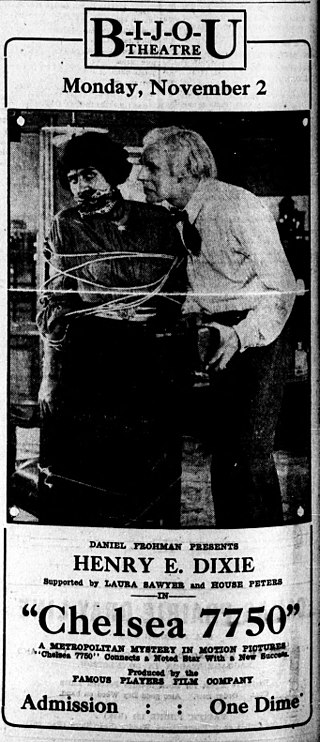
Chelsea 7750 is a surviving 1913 American silent crime drama film directed by J. Searle Dawley and starring Henry E. Dixey, Laura Sawyer, and House Peters. It was the fourth of six "Kate Kirby's Cases" detective stories made in 1913, the first produced by the Famous Players Film Company after Dawley and Sawyer left Edison for Famous Players.
An Hour Before Dawn is a lost 1913 silent film detective drama directed by J. Searle Dawley and starring Laura Sawyer and House Peters. It was the fifth of six "Kate Kirby's Cases" detective stories made in 1913, the second produced by the Famous Players Film Company after Dawley and Sawyer left Edison for Famous Players.
The Port of Doom is a lost 1913 silent film detective drama directed by J. Searle Dawley and featuring Laura Sawyer and House Peters. It was the last of six "Kate Kirby's Cases" detective stories made in 1913, the third produced by the Famous Players Film Company after Dawley and Sawyer left Edison for Famous Players.
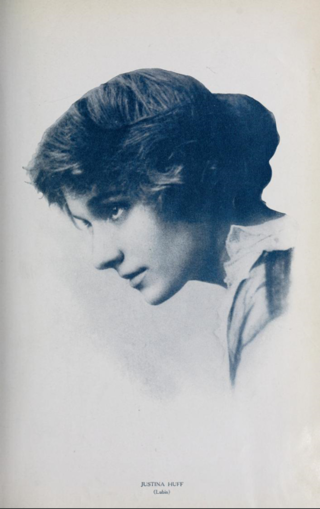
Justina Huff was an American actress of the silent film era.
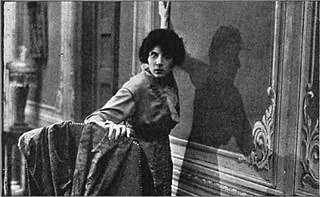
The Diamond Crown, from Edison Studios, was a 1913 American silent film (short) written and directed by J. Searle Dawley. It was the first of three "Kate Kirby's Cases" detective stories made in 1913 for Edison before Dawley and actress Laura Sawyer left Edison for Famous Players Film Co. later that year, where they produced three more. This film was also Justina Huff's debut in motion pictures. The Diamond Crown was released in the United States on July 12, 1913. This film is considered lost.
Batwoman is a name used by several characters of DC Comics, both in mainstream continuity and Elseworlds. The best known Batwomen are Kathy Kane and Kate Kane, while several original incarnations have appeared in adapted media.

Robert Brower was an actor who appeared in many American films. He appeared in several Edison films. He was lauded for his "characterizations" including in Apples of Sodom.
















